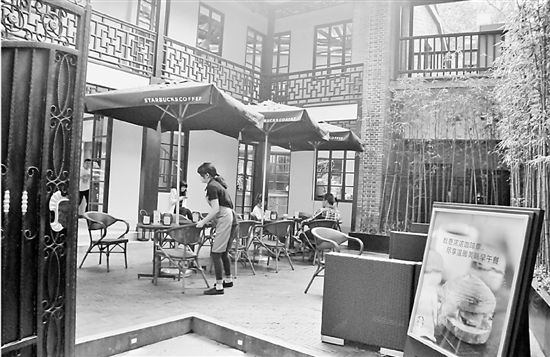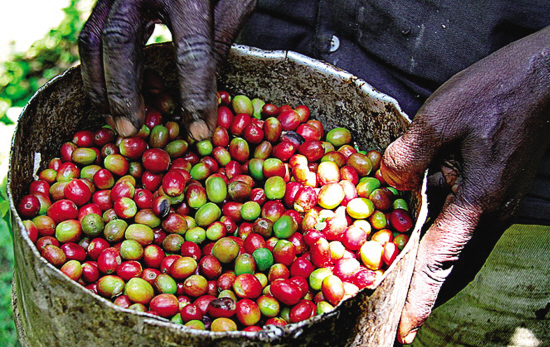How does "cultured coffee" smell? Attract people to stop with the "fragrance" of culture
At the end of last year, opposite the most popular broken bridge scenic spot in the West Lake in Hangzhou, two branches of Starbucks and McDonald's were opened one after another in the old house where Chiang Ching-kuo lived in the "Republic of China Fan".
Go into the "old house with stories" and have a cup of "educated coffee". This is how you shouted before you opened the shop. Unfortunately, when we opened the door to welcome guests, the cultural connotation display and historical atmosphere were only reflected in the introduction of a few pictures in the courtyard and a few old photos hanging on the wall of the store. Is history and culture really integrated into commercial development, or is it just "hanging" and "pasting" it? It's not hard for a discerning person to see.

What is even more unacceptable is that the project was originally submitted for approval in the name of "McCoffee", stating that it was "limited to the operation of coffee drinks" and "not used for catering". After opening, it was McDonald's fast food with French fries and hamburgers. A large number of catering kitchen equipment entered the cultural relic building, not to mention that even the living room of the main building with a view of the West Lake on the second floor was closed into a "do not enter" kitchen operating room.
In fact, as early as the beginning of last year, as soon as the EIA announcement of this project was disclosed, experts and scholars were not optimistic about the matching of cultural relics with coffee and fast food, and felt that there could be a more appropriate choice. What's more, there was no lack of sad lessons in the past, which caused irreversible damage to the old house.
Now, worry has proved not to be paranoid. Not to mention the old house of Chiang Ching-kuo's old house, he has formed an affinity with the writer Huang Yuan, mathematician Chen Jiangong, Qiongya revolutionary leader Feng Baiju and other figures, and witnessed the birth of the planning of the new Kunqu opera "15th Guan." its historical and cultural value is now full of commercial flavor, which has made many visitors call it a pity. It is even more chilling to say that it will openly violate the agreement that "shall not be used for catering".
Fortunately, many practices of installing shop advertisements directly on the outer wall and "wrapping" open corridors as rooms were stopped in time due to the timely intervention of the cultural relics management department. It can still be regarded as keeping the bottom line of "not changing the facade and original pattern of cultural relic buildings."
At this point, I can't help but ask, when the protection of cultural relics meets commercial development and utilization, how to make this cup of "cultural coffee" really fragrant?
The most important thing is to pay close attention to the key word "culture". If the history and culture of one city and one place is a big book, many chapters and paragraphs are written in the historical and cultural buildings. No matter what commercial use it is, it should be commensurate with this special place, so that the "password" of history and culture can be spread through the carrier of the old house. The original intention is to bring out the weight of history and taste the taste of culture through a cup of coffee. With the absence of history and culture, coffee only has a commercial flavor, which will inevitably become more and more light.
In terms of the format of commercial development, the phenomenon of "emphasizing catering rather than literary creation" should also be changed. Today, the catering industry in Hangzhou West Lake and the scenic area around the lake is as high as 28%, while the form of cultural innovation is obviously much less. There is no shortage of places to eat by the West Lake, but there is not enough cultural flavor. There is still a lot of market space for thoughtful and interesting cultural and creative places in the future.
In short, the development and utilization of cultural relic buildings should be "light", not just for immediate commercial interests. It is necessary to be "slow" and use the "fragrance" of culture to attract people to stop and stay. this is not only in line with the nature of historical and cultural architecture, but also in line with the current trend of the transformation from sightseeing to leisure tourism.
Of course, if cultural relics can be displayed in public welfare and cultural display for the main purpose, both experts and tourists will vote in favor of it. For example, on Beishan Road near Chiang Ching-kuo's former residence in Hangzhou, the historic building "Bodhi Jing House" has been renovated into Communist Party of China Hangzhou Historical Museum, and the historic building "Baoqing Villa" has set up the gallery of Hangzhou traditional Chinese painting Academy, which is open to the public free of charge. Carefully planned exhibition supplemented by modern science and technology, coupled with the charm of the old house itself, so that the old house to maintain the historical flavor, but also has vitality.
The article comes from China Daily.
Important Notice :
前街咖啡 FrontStreet Coffee has moved to new addredd:
FrontStreet Coffee Address: 315,Donghua East Road,GuangZhou
Tel:020 38364473
- Prev

The taste and flavor of the wonderful and unique African boutique coffee are becoming more and more popular.
Nowadays, with its high-quality characteristics, African coffee has occupied a place in the coffee consumption market in Fuzhou. The reporter learned from a number of cafes in Fuzhou that more and more people drink individual coffee, and many of them choose African coffee. Industry insiders believe that more and more people drink individual coffee, which shows that the coffee consumption market is becoming more and more mature, and consumers' understanding of coffee is constantly raised.
- Next

How does "cultured coffee" smell? Attract people to stop with the "fragrance" of culture
At the end of last year, opposite the most popular broken bridge scenic spot in the West Lake in Hangzhou, two branches of Starbucks and McDonald's were opened one after another in the city-level cultural relics conservation site and in Chiang Ching-kuo's old house. Go into the old house with a story and have a cup of educated coffee, which is how you shouted before you opened the shop. Unfortunately, it is a pity to open the door to welcome guests, to show the cultural connotation and to create a historical atmosphere.
Related
- Unexpected! Ruixing Telunsu lattes use a smoothie machine to foam milk?!
- % Arabia's first store in Henan opens into the village?! Netizen: Thought it was P's
- Does an authentic standard mocha coffee recipe use chocolate sauce or powder? Mocha Latte/Dirty Coffee/Salty Mocha Coffee Recipe Share!
- What is the difference between Vietnam egg coffee and Norway egg coffee? Hand-brewed single product coffee filter paper filter cloth filter flat solution!
- What is the difference between sun-cured and honey-treated coffee? What are the differences in the flavor characteristics of sun-honey coffee?
- How to make Italian latte! How much milk does a standard latte use/what should the ratio of coffee to milk be?
- How to make butter American/butter latte/butter Dirty coffee? Is hand-brewed coffee good with butter?
- Is Dirty the cold version of Australian White? What is the difference between dirty coffee/decent coffee and Australian white espresso?
- Relationship between brewing time and coffee extraction parameters How to make the brewing time fall to 2 minutes?
- Got entangled?! Lucky opens a new store, Mixue Ice City, and pursues it as a neighbor!

